MercoPress. South Atlantic News Agency
Tag: Ilan Goldfajn
-
Thursday, October 12th 2017 - 12:10 UTC
Brazilian central bank insists on the need to limit pension spending
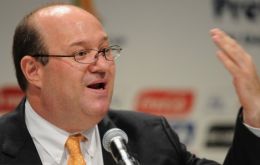
Brazil’s lawmakers can’t duck their responsibility to pass belt-tightening measures, central bank President Ilan Goldfajn told a Senate hearing in Brasilia this week. Reform proposals, particularly a constitutional amendment to limit pension spending, will help keep inflation low, reduce the structural interest rate and buoy the country’s overall recovery, Goldfajn said.
-
Tuesday, August 8th 2017 - 20:00 UTC
Brazilian economy on course to a modest growth (2%) next year
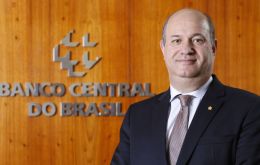
Brazilian Central Bank President Ilan Goldfajn said that Latin America's largest economy remains weak though it is on course to show modest growth next year. In an interview with a São Paulo radio station, he said Brazil may achieve growth of 2% in 2018 if the economy continues expanding at its current pace.
-
Friday, June 30th 2017 - 03:14 UTC
Unions to hold second strike against Temer's reforms
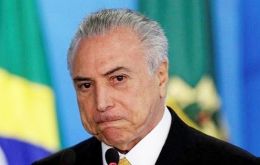
Brazil's union federations will hold a second strike on Friday with demonstrations against the government's economic reforms and to demand the resignation of President Michel Temer, who has vowed to approve labour flexibility in the coming weeks.
-
Tuesday, January 31st 2017 - 21:03 UTC
Brazilian government is “meeting its budget deficit”, says minister Meirelles
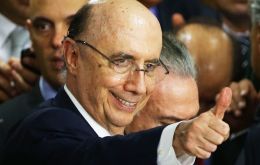
Brazil's central government registered a primary budget deficit of 154.255 billion reais (US$49.40 billion) in 2016, meeting its target but recording a third consecutive annual deficit that reflects the dire state of the country's finances. In December, the country posted a primary deficit of 60.124 billion reais (US$19.25 billion).
-
Tuesday, November 22nd 2016 - 14:10 UTC
Brazil admits Trump policies could cause a flow out of capital from emerging economies

Brazil's Central Bank (BC) President Ilan Goldfajn said on Monday that the outcome of the US presidential election, won by magnate Donald Trump, brought an element of uncertainty to markets, but reiterated that the institution has kept a close watch on the development of international markets and worked to prevent the effects of “external shocks” from threatening macroeconomic stability.
-
Thursday, September 1st 2016 - 10:02 UTC
Brazil central bank keeps rates unchanged for the ninth straight time
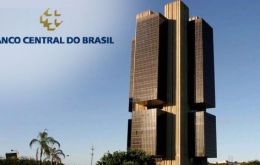
Brazil's central bank kept interest rates at a decade high for the ninth straight time on Wednesday, but did not discard a cut rate later this year if stubbornly high inflation subsides. In a unanimous vote, the bank's monetary policy committee, Copom, kept its benchmark Selic rate at 14.25%, its highest since July 2006.
-
Monday, August 15th 2016 - 07:19 UTC
Brazil concerned about the 25% surge of the Real against the US dollar
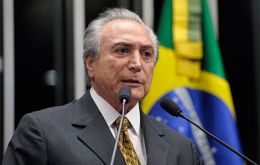
The Brazilian Real weakened further on Friday after interim President Michel Temer showed concern over currency strength, while stocks edged lower following a heavy batch of quarterly results including state controlled oil company Petrobras.
-
Thursday, June 9th 2016 - 09:06 UTC
Brazil's central bank leaves interest rate unchanged at 14.25%
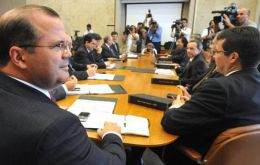
Brazil held interest rates steady for the seventh straight time on Wednesday, resisting pressure to slash borrowing costs amid a recession as inflation remains near double digits. In a unanimous vote, the central bank's monetary policy committee, Copom, decided at its last meeting led by governor Alexandre Tombini to keep its benchmark Selic rate at 14.25%, the highest in nearly a decade.
-
Wednesday, May 18th 2016 - 06:01 UTC
Orthodox economist Goldfajn confirmed as Brazil's central bank governor

Brazil's interim government on Tuesday confirmed the lead economist of the country's largest private bank to head the central bank, in a further shift away from the interventionist policies that many blame for deep recession and near double-digit inflation.
-
Monday, May 16th 2016 - 06:01 UTC
Brazil's Jewish community supports Temer; hopeful of normalization of relations with Israel
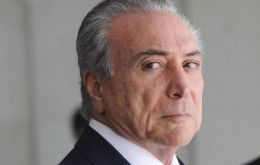
The elevation of a centrist vice president, Michel Temer, as Brazil’s president amid the impeachment process of Dilma Rousseff is expected to result in a less strained relationship between Brazil and Israel, as well as its Jewish community, Jewish leaders in Sao Paulo said.
